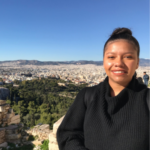Finger snaps toppled over one another in the classroom. Rain trickled down the school’s windows, but the excitement of the students wasn’t dulled by the bad weather. Alan King—a poet from Bowie, MD—was discussing his poem “Mr. On-Time” with students at E. L. Haynes Public Charter School. The poem is written from the perspective of a serial rebound—the person who (in this case, knowingly and intentionally) swoops in after a recent breakup.
After quiet applause, a student asks, “Did you ever feel youth? Did the narrator ever feel youth?”
The poet pondered the question for a beat. “That poem came out of a dare… My favorite poet, he challenged me. He wanted me to take the position of a show-off.” The show-off, in this case, is “Mr. On-Time,” whose story revolves around his precision in finding significant others who just ended romantic relationships.
The students murmured to each other between questions, sharing their thoughts and reactions. Quieter students took careful glances at the book’s pages. Not a head was down or a page left unturned as the conversation continued.
King searched for the poem in her book while he shared his own take on the titular character. He explained: “I actually hate guys that act like this.”
“It’s on page 68,” a student in a pastel jacket interrupted. Chuckles filled the room as the author thanked the student for her assistance.
During Q&A, the poet could not meet the demand for student questions. A student blurted out to his teacher, “What strings did you pull to get him here?”
King smiled.
– Jamecion Green
Alan King’s “Mr. On-Time” is in his collection Point Blank.
“What does it mean to forgive?”
Derrick Weston Brown, a DC-area poet by way of Charlotte, NC, looks around at the sleepy high school students: this is their first class of the day, and several students arrived late, slouching into their seats at the mention of poetry.
A girl with glasses and long, black hair finally raises a hand. “It means to relieve your heart of the past.”
Another student chimes in, adjusting his black sweatshirt while he speaks. “You regret something from your past that you didn’t realize was bad then, but you know it now and you try to make it right.”
Derrick shares his poem “Forgiveness,” which addresses colorism in the Black community and is written to a girl from his childhood who was relentlessly bullied for having too-dark skin. “Forgive me for holding / white washed fairy tales / as truth,” Derrick reads, and students’ heads nod. “Forgive my ugliness / and my dark heart.” He follows this with a clip of Elizabeth Acevedo reading her poem “Hair,” an electrifying push against colonialism and white supremacy through the embrace of “wild curls” like “ancestors spiraling.”
Students are invited to write their own forgiveness poem using imagery and sensory language. When the writing timer goes off, students beg for more time to write. When it’s time to share, hands shoot up from nearly every student in the class. Asking forgiveness of siblings is one theme; so is asking for forgiveness from one’s family. The poems are emotional, moving, and occasionally funny. Nathaly winkingly asks for forgiveness for unapologetically stealing away the most attractive guy in school.
One student simply writes, over and over, “I’m sorry.” Class ends and the students depart, carrying into their day a nugget of absolution.
— Lacey N. Dunham
Derrick Weston Brown’s “Forgiveness” is in his collection Wisdom Teeth. Watch Elizabeth Acevedo perform “Hair” here.
“What can you imagine about the woman in the photo?”
Little hands shoot up across the classroom, each of the third-grade students eager to give an opinion about the artwork on display.
I call on a student with his brows knitted together to come upfront. “I don’t think I get this one,” he says.“She looks just like a normal person.”
There’s a hum of agreement from his peers as a dozen eyes flit up to the projected image on the board, searching for some hint or clue about the painting. The relaxed posture of a Black woman in a sundress is a stark contrast to the statuesque, king-like posing of the subject in the previous artwork. Amy Sherald’s cool pastels strike a different tone to Kehinde Wiley’s vibrant red and gold floral background.
It might be easier to imagine a story based on a knight holding a sword instead of an ordinary person with a bike on a sunny day. Still, I urge the students to challenge themselves in their writing, to imagine what it might feel like to be in the painting A Midsummer Afternoon Dream.|
When it’s time for students to share their stories, the teacher directs me to the back, where a girl with short brown hair hides her paper. She’s too shy to speak but asks me to read the words for her. In her story, the woman in the painting is on a journey to reach the sun. In the photo, she rides the bike “up, up, up, until she’s higher than the clouds.” When she finally reaches the sun and touches it, “happiness comes through her like sunlight shining down.”
Her story leaves me feeling warm, like the dreamy summer day she described. When I finished reading, there’s a smile on my face. She gets it.
— Faith Angel Campbell, Inspired by Black Art
Inspired by Black Art is a Pen/Faulkner Writing Workshop. In this workshop, students write a short piece using inspiration from African American artists Kehinde Wiley and Amy Sherald.
It’s a Monday morning, and the fifth graders are sleepy. Then, Kelly J. Baptist smiles and says, “Young people inspire me… if you have never thought about yourself as a hero I am here to tell you that you are absolutely a hero.” The students’ eyes light up.
Students lean in as Kelly tells how she started writing and what motivates her when she gets stuck during the writing process. A few students bounce excitedly in their seats as they wait for their chance to speak. When it’s time for Q&A, students’ hands fly up in the air.
The educator, Ms. Jones, fields questions, and Kelly answers them with earnest details. Ms. Jones says, “I’ve seen a variety of this same question so I’ll do my best to rephrase it: How do you make time to write books if you work in a school and also manage your five kids?”
Kelly chuckles. “Life is busy! I do have a writing space but most of my writing is done outside of that writing room. A lot of my writing is spent in the car. It’s difficult to squeeze in the time for writing but when you love something you make the time to do it.”
Ms. Jones nods emphatically, and I find myself nodding as well. I feel a warm rush at the end of Kelly’s words. One of the biggest reasons I love working on the education team at PEN/Faulkner is because we connect authors and DC students to deeply meaningful experiences through the shared love of books and writing. Kelly’s words show students that writing books may be challenging at times but it’s worthwhile.
Kelly’s final words about her passion and love of writing stories hang in the air as the author visit wraps up. Ms. Jones tells Kelly, “Thank you so much for your time. We have loved reading The Swag Is in the Socks. We hope to meet you soon in person!” As we close out the visit I hope that students walk away with that precious wisdom that persistence and loving what you do can pay off.
— Adriana Thornton
For this Writers in Schools visit, all students at the visit received a copy of Kelly J. Baptist’s The Swag Is in the Socks.
Students tumble into the classroom, whirling with the energy for the lunch bell to come. Tony Lewis Jr. stands in a corner of the room away from the bright fluorescent lights. Students look curiously at the new face in their classroom.
Tony takes to the front, the room packed with students in desks that are close together. He begins by sharing about his father’s incarceration for the last thirty-three years, capturing twenty-three gazes as he talks. In his memoir Slugg: A Boy’s Life in the Age of Mass Incarceration, Tony speaks of growing up with a father who went from being a DC drug kingpin who “had it all” to being incarcerated away from his family for over three decades.
A young boy wearing a hoodie and slumped at his desk asks, “How did you deal with the loss of your father?”
The room is silent. Tony’s expression grows thoughtful., “My dad is one of the reasons I am who I am today. It was hard because I needed him here [with me]. We are as close as we possibly can be with him still in prison.”
The boy’s posture snaps straight, and he shares, “I can relate to not having my dad in my life. He has not been present. He is incarcerated, too.” The room shifts to a safe space as other students begin to share about their own challenging home lives and absent parents.
At the end of the author visit, Tony leaves the students with a final thought to carry from school into their lives. “It’s okay to acknowledge that [these hard times at home] hurt. That the situation may not get better, but you got to. Tough guys are in the cemetery or prison. I like the type of tough guy I am now. We all have the infinite ability to make an impact.”
The same boy approaches Tony with admiration in his wide brown eyes after connecting over losing their fathers to the criminal injustice system. “Thank you,” he says.
The room is no longer rushing to lunch as students linger with Tony’s words in their minds.
— Maya A. Lawrence
Slugg: A Boy’s Life in the Age of Mass Incarceration by Tony Lewis Jr.





